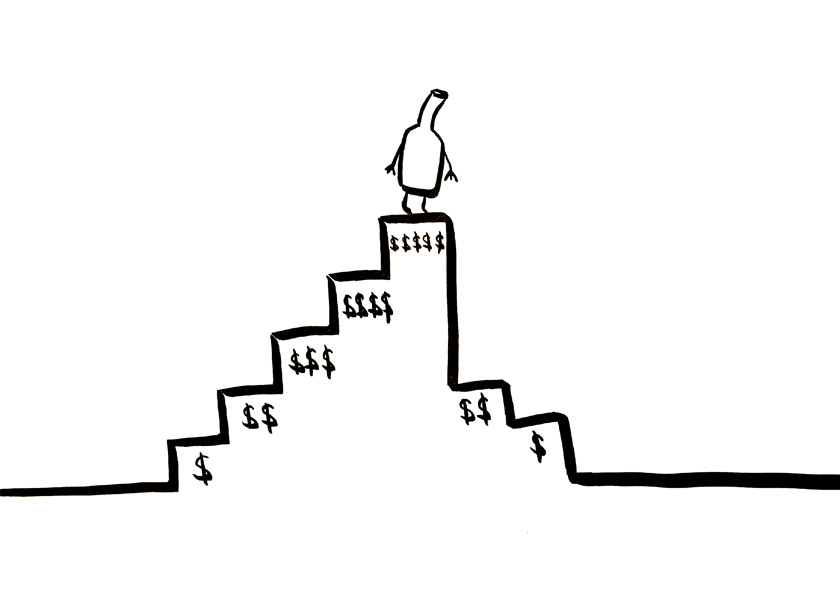A Salesperson's Guide to Determining Whether It's You or Your Company That's Peaked
If it's not you, it's them
Culturally, we are obsessed with growth. Governments want to increase GDP. Companies seek to scale. An increase in one’s paycheck is a yardstick for success. Our willful blindness to the notion that decline, whether it is temporary or long-lasting, is inevitable, dooms many to ruin. Neither cities nor countries adequately prepare for shrinking populations. Corporations collapse in their failure to foresee anything but the rosiest future.1 And individuals are usually ill-equipped for their professional reckoning.
Wine and spirits businesses are not immune to such folly. They must recognize that the very tools of their growth—technology, talent, and creative destruction—aid their competitors as well. Broadly speaking, over time corporate advantages fade.
Specific to our industry, once large geographic and regulatory moats have diminished over the last twenty years. However, despite aggregate industry growth, many businesses will likely shrink as the slices of the pie become thinner and thinner with each new producer, importer, and distributor entering the market.
As such, wine and spirit professionals must be skeptical of any company, brand, or product, that claims its shine will last forever. Tastes change, portfolios wane, brands come and go. The challenge for the individual sales rep is in discerning:
Whether the decline is transitory. Is it a matter of “this, too, shall pass?” Or is a recent decline emblematic of some longer-term challenges?
Whether the decline is representative of their own reduced performance, the company’s decreased numbers, or both.
Here are five questions to ask when you’re wondering whether you’ve hit peak:
What’s the benchmark for success?
Simply looking at whether your sales go up or down isn’t enough. To properly gauge where things stand you need a benchmark, a quantitative criterion against which to measure your performance. Useful yardsticks include your company, colleagues, and/or category of product (company-specific or industry-wide). It’s best to use as many of these measures as possible to gain a clear understanding of performance. If statewide spirit sales are up and your sales are up, but your company’s sales are consistently underperforming (by comparison), then you might be staring at a fast-approaching ceiling.
“New” products: are they additions or replacements?
Importers and distributors like to tout when that they pick up a new wine or spirit. When judging whether the said product is a true boon to your potential continued growth you must examine whether it is an addition to the book or a just replacement for something that exited the portfolio. A merry-go-round of selections might keep customers excited and you busy, but it could indicate that the company has peaked and thus capped your sales. Keeping a count of total SKUs will give you some indication of whether your company’s offerings are growing.2
Am I being blamed? Am I being buoyed?
Sales is a team sport. You might hit the street alone, but you have an order board, sales manager, and others that aid you in achieving your goals. When there is a decline in sales, do you all come together to figure out how to rectify things, or does the blame solely land at your feet (or someone else's)?
In a similar vein, you’re only as good as your weakest teammate. Are your colleagues buoying you or acting as an anchor? Don’t let a weak team define your peak.
What hasn’t changed?
Ben Carlson writes “Amazon’s Jeff Bezos once said he frequently gets asked the question, ‘What’s going to change in the next 10 years?’ But he almost never gets asked, ‘What’s not going to change in the next 10 years?’”
If you keep hitting your head against the ceiling of growth, don’t expect change as a given. Invert and ask yourself about what hasn’t changed with you, with your company, with its processes. If the prerequisites for growth—an evolving portfolio, improved management, a growing pool of talented coworkers, implementation of efficient processes and technologies—were never there to begin with, what’s the likelihood they’ll be adopted in the future?
Will growth make my job better? Will growth make me happier?
If the ramification of growth is a more stressful job and/or work environment, then most goals will be moot. You likely already know if the system you work within is designed to scale along with your sales or keep you from getting a sound night’s rest.
According to Boston Consulting Group, “The life span of corporations has nearly halved over just three decades.”
Increased SKU count could also be indicative of stale inventory, particularly when it comes to stocking multiple past vintages of a particular wine. It should be easy enough to differentiate between this and increased product offerings.

